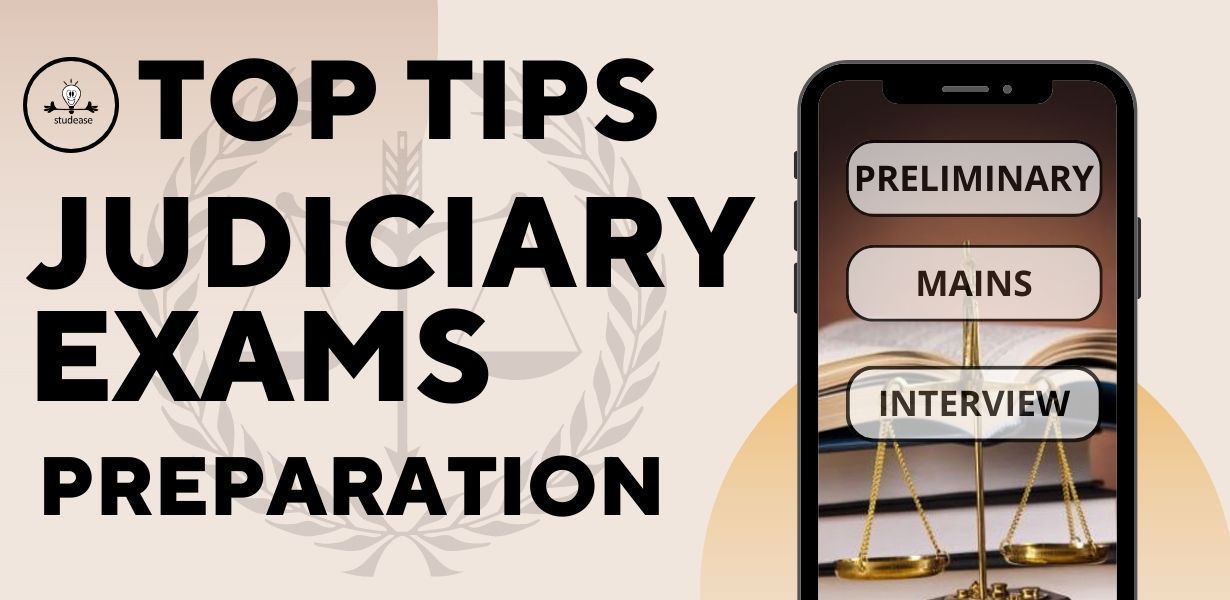Judiciary Exam Preparation Tips to Crack the Judiciary Exam in First Attempt

Have you ever thought about this thing that there is a procedure for the selection of Judges in India?
Well in this post, I will cover all the questions related to the Judiciary Exam Preparation Tips and strategies for the same.
I am going to cover different topics like:
How to Read Bare Act,
How to prepare for Judiciary Exams
Which subjects to be covered first
Strategy to Score Good in the Exam
Best Books to read
Judiciary Exam Syllabus
…and thus increase the chances to crack judiciary examination.
How to read Bare Act – Judiciary Exams
Starting with the first point,
This is one of the most relevant topics of discussion amongst Law students:
What is the Proper Way to read the Bare Act?
You need not worry about it anymore as in this post I will clear all the doubts related to Judiciary Exams in India.
Bare Act is the Key as far as Law examinations are concerned, but as per the law school curriculum, the students are taught directly from elaborative Course books.
Bare Act covers content related to each subject with explanation and case laws, missing the very basics of study for every competitive law examination; its the BARE ACT.
If you are a beginner or about to start the preparation for Judiciary Exam examination, you must be well versed with the meaning of the Bare Act.
What is the Bare Act?
The bare act is the bare law/legal language which the parliament has passed.
In layman language, Bare Act covers the law in proper sequence/section numbers in a way that all the topics related to the subject are covered,
But, all the provisions are covered with basic legal terms, and those terms are not explained.
To understand what is written in the bare act, for the beginners, it is suggested that they should read the bare act and read relevant sections from the textbook with explanation side by side.
Try doing it for one or two subjects….Soon YOU can understand the language of the bare act for other subjects as well.
Here I would like to post some example in the form of a video which will further help you to understand the basics related to the reading of the Bare Act for Judicial Exams. ( Video is in Hindi Language ) but the written text is covered in this post.
Many students are not able to crack the Judiciary Examination, and in this video, I Have covered the reasons for the same.
This post will help you to clear the judicial examination and score well in the exams. Read the bare act in a way that you get well versed with the provisions of the Bare Act.
Benefits of reading Bare Act
There will be two benefits of investing your time in the Bare Act.
First and foremost, you will get a good exposure regarding the content and basics of the act.
The second one will be a foundation stone for the Judiciary Mains Examination Preparation as reading the Bare Act, again and again, will help you master the bare act in short period.
Now, You might be thinking about one thing that How the Preparation has to be Done for Judiciary Exams?
It’s Rightly said:
“Where there is a WILL, There is a WAY”
It is crucial to get acquainted with the course outline and suggested literature. This will provide you with a better understanding of the subject matter to concentrate on and the resources to utilize.
After gaining a good understanding of the syllabus, you can devise a study schedule that includes daily objectives and a timeline for finishing each topic. This approach will assist you in staying on track and avoiding last-minute cramming.
Moving on to the second aspect,
Before starting the Judiciary preparation, make sure that you arrange the best authentic material to study and compile all the content that you can collect from the available sources. This is the
“first ladder to success in Judiciary Examination.”
For your reference, I have posted a video covering the best books to be read for Judiciary Examination. There may be other good books for judiciary examination that can be bought for state-specific subjects.
If you have started the preparation in the recent past or about to graduate from a law college then to make the things right and work in a better way there is a plan to score good in the Judiciary Preliminary Examination.
Your Goal can be achieved by covering few subjects first which will cover a major portion of the Examination for Civil Judge; Judicial Magistrate First Class, Junior Law Officers and District Attorney Examination ( including Assistant District Attorney Examination ).
This is the list of subjects to be covered first for any competitive law Exam:
1 Criminal Procedure Code,
2 Indian Penal Code,
3 Indian Evidence Act, 1872
4 The Constitution of India
5 Code of Civil Procedure, 1908
How to Score Good in Judiciary Exam?
Well, let me discuss the Judiciary Examination Stages and How to tackle the scenario in an easy way.
Many times I have witnessed that students are confused about the overall preparation strategy for the examination, and at times they do not get proper guidance to deal with the situation.
I will share some practical solutions to get maximum output with regard to this examination.
Judiciary Exam Preparation Tips:
Tip #1 Study Plan
A well-structured study plan is the foundation of effective preparation. Create a study plan that covers all the topics in the syllabus and allocate enough time for each subject. Make sure to include time for revision and practice.
Tip #2 Resources
Collect all the necessary resources for your preparation. This includes textbooks, bare acts, online resources, and previous year’s papers. Make sure to choose reliable sources that cover all the topics in the syllabus.
Tip #3 Bare Act is the Key
Bare acts are the backbone of Judiciary Exams. Make sure to read and understand the bare acts thoroughly. It will help you in answering the questions more accurately.
Tip #4 Best Books to Study
Choose the best books that cover all the topics in the syllabus. Refer to the books that are recommended by experts and toppers. Make sure to read the books thoroughly and make notes.
Tip #5 Make Notes
Making notes is crucial for effective preparation. It helps you in retaining the information better. Make sure to make concise and organized notes that cover all the important points.
Tip #6 Write Essays
Answer writing is an essential part of Judiciary Exams. Practice writing essays on various topics. It will help you in improving your writing skills and in answering the questions more effectively.
Tip #7 Landmark Judgements
Landmark judgements are important for Judiciary Exams. Make sure to read and understand the landmark judgements thoroughly. It will help you in answering the questions more accurately.
Tip #8 Practice MCQs
Practice solving MCQs on various topics. It will help you in improving your problem-solving skills and in answering the questions more effectively.
Tip #9 Stay Updated with Current Affairs
Stay updated with the latest current affairs. It will help you in answering the questions related to current events more accurately.
Tip #10 Revision
Revision is the key to effective preparation. Make sure to revise all the topics thoroughly. It will help you in retaining the information better and in answering the questions more accurately.
By following these tips, you can prepare effectively for Judiciary Exams. Remember, hard work, practice, and dedication are the keys to success.
Coming on to the Stages in Judiciary Exam:
Judiciary Exam is divided into three stages:
- Preliminary Stage
- Mains Stage
- Interview Stage
In order to plan in an effective way, let’s deal with it step by step.
For the preliminary stage, Multiple Choice Questions is the pattern. Basic knowledge about the bare act is sufficient but for States like Delhi, Punjabi and Haryana etc.
Something more has to be done as the pattern of examination is changing with time.
It can be said that a few years back, the portion of the paper was easy as it was directly from section numbers, illustrations and bit of fact-based situations.
In recent time the pattern is changing and thorough knowledge of the Bare Act is required in order to get through.
The second stage of the examination is the Mains which covers subjective question formations and also language part that is Hindi, English and other state-specific languages.
For Mains part, a full understanding of the subject is required to attempt the questions in the examination.
The last and the final stage is the Interview part which judges overall traits of one’s personality. This part should be focused on from day one of the preparations of this prestigious examination.
One more doubt that comes to mind is; Do I need to learn all the Sections of the Bare Act?
I hope this post helped you know about the ins and outs of the Judiciary Examination. Do give your feedback or your views in the Comment box below.
All the Best!
Gagandeep Singh






Respected Sir,
Delhi higher judicial services examination notification is published now…and they have enhanced syllabus in many folds…please make a video how to cover all these acts in such short time…and for higher judiciary what should be an approach in Delhi….there are many acts which I have never read before
Than pls help me